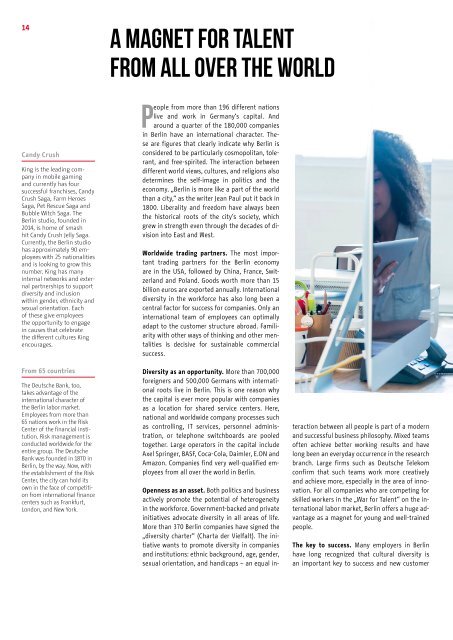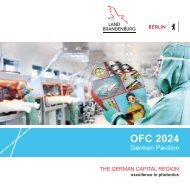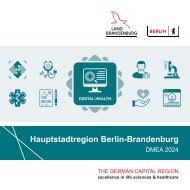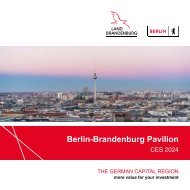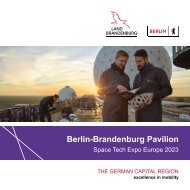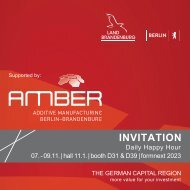Berlin: Your Business Location
You also want an ePaper? Increase the reach of your titles
YUMPU automatically turns print PDFs into web optimized ePapers that Google loves.
14<br />
A magnet for talent<br />
from all over the world<br />
Candy Crush<br />
King is the leading company<br />
in mobile gaming<br />
and currently has four<br />
successful franchises, Candy<br />
Crush Saga, Farm Heroes<br />
Saga, Pet Rescue Saga and<br />
Bubble Witch Saga. The<br />
<strong>Berlin</strong> studio, founded in<br />
2014, is home of smash<br />
hit Candy Crush Jelly Saga.<br />
Currently, the <strong>Berlin</strong> studio<br />
has approximately 90 employees<br />
with 25 nationalities<br />
and is looking to grow this<br />
number. King has many<br />
internal networks and external<br />
partnerships to support<br />
diversity and inclusion<br />
within gender, ethnicity and<br />
sexual orientation. Each<br />
of these give employees<br />
the opportunity to engage<br />
in causes that celebrate<br />
the different cultures King<br />
encourages.<br />
P<br />
eople from more than 196 different nations<br />
live and work in Germany‘s capital. And<br />
around a quarter of the 180,000 companies<br />
in <strong>Berlin</strong> have an international character. These<br />
are figures that clearly indicate why <strong>Berlin</strong> is<br />
considered to be particularly cosmopolitan, tolerant,<br />
and free-spirited. The interaction between<br />
different world views, cultures, and religions also<br />
determines the self-image in politics and the<br />
economy. „<strong>Berlin</strong> is more like a part of the world<br />
than a city,“ as the writer Jean Paul put it back in<br />
1800. Liberality and freedom have always been<br />
the historical roots of the city‘s society, which<br />
grew in strength even through the decades of division<br />
into East and West.<br />
Worldwide trading partners. The most important<br />
trading partners for the <strong>Berlin</strong> economy<br />
are in the USA, followed by China, France, Switzerland<br />
and Poland. Goods worth more than 15<br />
billion euros are exported annually. International<br />
diversity in the workforce has also long been a<br />
central factor for success for companies. Only an<br />
international team of employees can optimally<br />
adapt to the customer structure abroad. Familiarity<br />
with other ways of thinking and other mentalities<br />
is decisive for sustainable commercial<br />
success.<br />
From 65 countries<br />
The Deutsche Bank, too,<br />
takes advantage of the<br />
international character of<br />
the <strong>Berlin</strong> labor market.<br />
Employees from more than<br />
65 nations work in the Risk<br />
Center of the financial institution.<br />
Risk management is<br />
conducted worldwide for the<br />
entire group. The Deutsche<br />
Bank was founded in 1870 in<br />
<strong>Berlin</strong>, by the way. Now, with<br />
the establishment of the Risk<br />
Center, the city can hold its<br />
own in the face of competition<br />
from international finance<br />
centers such as Frankfurt,<br />
London, and New York.<br />
Diversity as an opportunity. More than 700,000<br />
foreigners and 500,000 Germans with international<br />
roots live in <strong>Berlin</strong>. This is one reason why<br />
the capital is ever more popular with companies<br />
as a location for shared service centers. Here,<br />
national and worldwide company processes such<br />
as controlling, IT services, personnel administration,<br />
or telephone switchboards are pooled<br />
together. Large operators in the capital include<br />
Axel Springer, BASF, Coca-Cola, Daimler, E.ON and<br />
Amazon. Companies find very well-qualified employees<br />
from all over the world in <strong>Berlin</strong>.<br />
Openness as an asset. Both politics and business<br />
actively promote the potential of heterogeneity<br />
in the workforce. Government-backed and private<br />
initiatives advocate diversity in all areas of life.<br />
More than 370 <strong>Berlin</strong> companies have signed the<br />
„diversity charter“ (Charta der Vielfalt). The initiative<br />
wants to promote diversity in companies<br />
and institutions: ethnic background, age, gender,<br />
sexual orientation, and handicaps – an equal interaction<br />
between all people is part of a modern<br />
and successful business philosophy. Mixed teams<br />
often achieve better working results and have<br />
long been an everyday occurrence in the research<br />
branch. Large firms such as Deutsche Telekom<br />
confirm that such teams work more creatively<br />
and achieve more, especially in the area of innovation.<br />
For all companies who are competing for<br />
skilled workers in the „War for Talent“ on the international<br />
labor market, <strong>Berlin</strong> offers a huge advantage<br />
as a magnet for young and well-trained<br />
people.<br />
The key to success. Many employers in <strong>Berlin</strong><br />
have long recognized that cultural diversity is<br />
an important key to success and new customer


